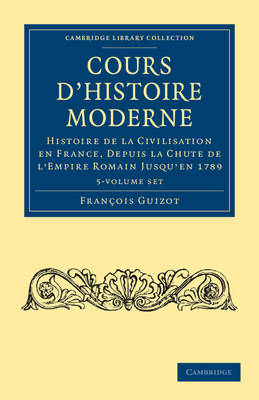Cambridge Library Collection - European History
3 primary works • 6 total works
Volume 1
French politician Francois-Pierre-Guillaume Guizot (1787-1874) is well-known for establishing 'Guizot's law', which implemented primary education for all French citizens. As well as occupying various political offices during some of the most turbulent years in his nation's political history, Guizot was also an historian and was appointed to the chair of modern history at the Sorbonne in 1812. First published between 1829 and 1832, this five-volume history of 'civilisation in France' is based on a series of lectures delivered in 1828. The books are described as covering the period from the end of the Roman Empire to 1789, but the main focus is on the medieval period, to the death of St Louis (1270). Appearing in 1829, Volume 1 begins with an outline of Guizot's underlying historical principles and ends with an account of the church in France from the sixth to the eighth century.
Volume 2
French politician Francois-Pierre-Guillaume Guizot (1787-1874) is well-known for establishing 'Guizot's law', which implemented primary education for all French citizens. As well as occupying various political offices during some of the most turbulent years in his nation's political history, Guizot was also an historian and was appointed to the chair of modern history at the Sorbonne in 1812. First published between 1829 and 1832, this five-volume history of 'civilisation in France' is based on a series of lectures delivered in 1828. The books are described as covering the period from the end of the Roman Empire to 1789, but the main focus is on the medieval period, to the death of St Louis (1270). Published in 1829, Volume 2 continues the story of the Carolingians, ending with the breakdown of the empire after the death of Charles the Fat in 888.
Volume 3
French politician Francois-Pierre-Guillaume Guizot (1787-1874) is well-known for establishing 'Guizot's law', which implemented primary education for all French citizens. As well as occupying various political offices during some of the most turbulent years in his nation's political history, Guizot was also an historian and was appointed to the chair of modern history at the Sorbonne in 1812. First published between 1829 and 1832, this five-volume history of 'civilisation in France' is based on a series of lectures delivered in 1828. The books are described as covering the period from the end of the Roman Empire to 1789, but the main focus is on the medieval period, to the death of St Louis (1270). Volume 3 discusses France from the death of Charlemagne in 814 to the reign of Hugh Capet (939-96), including relations with the papacy, and ends with a review of the narrative so far.
French politician Francois-Pierre-Guillaume Guizot (1787-1874) is well-known for establishing 'Guizot's law', which implemented primary education for all French citizens. As well as occupying various political offices during some of the most turbulent years in his nation's political history, Guizot was also an historian and was appointed to the chair of modern history at the Sorbonne in 1812. First published between 1829 and 1832, this five-volume history of 'civilisation in France' is based on a series of lectures delivered in 1828. The books are described as covering the period from the end of the Roman Empire to 1789, but the main focus is on the medieval period, to the death of St Louis (1270). Volume 5 concludes the series, discussing France during the reigns of Philippe-Auguste and St Louis, but looking ahead to the rise of the Third Estate.
French politician Francois-Pierre-Guillaume Guizot (1787-1874) is well-known for establishing 'Guizot's law', which implemented primary education for all French citizens. As well as occupying various political offices during some of the most turbulent years in his nation's political history, Guizot was also an historian and was appointed to the chair of modern history at the Sorbonne in 1812. First published between 1829 and 1832, this five-volume history of 'civilisation in France' is based on a series of lectures delivered in 1828. The books are described as covering the period from the end of the Roman Empire to 1789, but the main focus is on the medieval period, to the death of St Louis (1270). Following the success of its initial publication, Guizot's history ran to several editions, influencing a great revival of interest in the study of French history in the nineteenth century.
French politician Francois-Pierre-Guillaume Guizot (1787-1874) is well-known for establishing 'Guizot's law', which implemented primary education for all French citizens. As well as occupying various political offices during some of the most turbulent years in his nation's political history, Guizot was also an historian and was appointed to the chair of modern history at the Sorbonne in 1812. First published between 1829 and 1832, this five-volume history of 'civilisation in France' is based on a series of lectures delivered in 1828. The books are described as covering the period from the end of the Roman Empire to 1789, but the main focus is on the medieval period, to the death of St Louis (1270). Volume 4 discusses the developing sense of national identity in France in the tenth century and ends with an examination of the monarchy and of feudal society at the death of Louis VII (1180).

